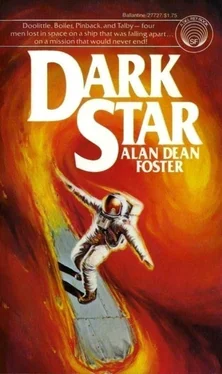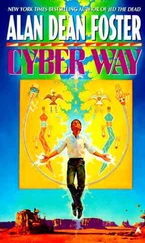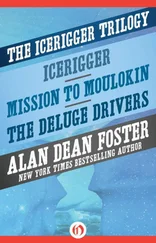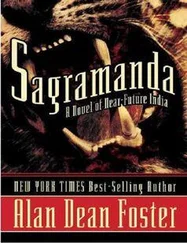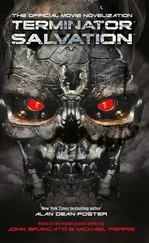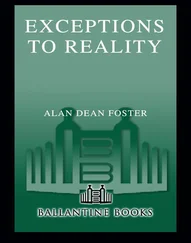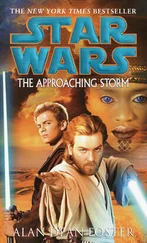A NEW INTERSTELLAR ADVENTURE
DARK STAR
by Alan Dean Foster
Adapted from the script by Dan O’Bannon and John Carpenter
“Auprès de ma blonde,
qu’il fait bon, fait bon, fait bon.
Auprès de ma blonde,
qu’il fait bon dormir…!”
TALBY WAS COUNTING stars again.
He didn’t remember exactly when he’d lost count. Probably they were all noted down somewhere neat and official in the astronomer’s records—or had he disconnected the tracker? It was hard to recall. There seemed to be something about uncoupling all the scientific instruments a while back, uncoupling them because it seemed blasphemous for such splendor to be reduced to a mere listing in a book.
Anyhow, the number didn’t matter, did it? There were plenty of stars to go around, and if the muddlers back on Earth wanted records of them, let them come out here for themselves and do their own tracking. Talby didn’t see how anyone could appreciate a star by using mere mathematical charts.
But he kept counting. It was easy. It was natural. It made a man free—one star, two stars, and baby makes three.
With only the naked eye, most navigators could distinguish only a few degrees, magnitude, but Talby had had more practice than most navigators. And he lived his work.
To get really good at it, you had to spend long stretches in practice, sharpening your perception and senses until eyes and mind operated instinctively. Ho could a man take the measure of a sun if he had to stop and think about it? Talby smiled.
He leaned back in the pneumatic astronomer’s lounge, a pale bean in a pod of smooth maroon, and stared up through the dome. He’d buffed down the inside and outside so many times that the dome was almost impossible to see. Every imperfection had been scrubbed out of it, till now there seemed to be no dome. Only Talby and his seat, floating in a hole on the top of the ship.
Now and then the soft touch of a finger initiated a muted hum of precision machinery. The chair would, swivel 90, 180, 270 degrees, and another section of the cosmos would come under Talby-scrutiny.
Five, six, pick up sticks.
Talby could distinguish almost every order of magnitude now. Of course, when the stars were your best friends, you didn’t have to work very hard to find out about them. You didn’t even have to ask. They told you and were happy to, confessed all their secrets without prodding, without coercion, without being violated by clumsy, poking, grabby machines.
That was the trouble with man’s first extended explorations of deep space. He’d gone at it as he had gone at everything else throughout his history—hacking and clubbing and chopping, an ax in one hand and a scythe in the other. Never a moment to listen, to look, to try to see and understand. It was sad.
And it was so easy not to make the same old mistakes over again! If only they would try it his way, if only he could make them see. Talby shook his head, though there were none but the stars to see it. Useless. They wouldn’t listen. They never listened.
Better to do it this way. At least he offended no one. At least one man had succeeded in blending with the universe without inflicting himself on it. And the universe repaid him in kind.
The others looked on his special relationship rather differently, of course. Poor middling souls—his greatest regret was that he couldn’t share his pleasure with them.
Of them all, Doolittle came the closest to understanding, and even he insisted that the astronomer spent too much time up here in the dome, too much time alone, too much time staring into naked, empty space.
Empty space—poor, sad Lieutenant Doolittle! It was only empty inside the ship. They’d never understand that, either.
It had been only a few days, a few months, a few years. No doubt one day Doolittle might insist it had been too many centuries. It made no difference to Talby. He had accomplished the neat feat of dividing the universe into three parts: himself, the rest of the cosmos, and his fellow crewmembers. Doolittle, Pinback, Boiler and Commander Powell.
No—no, that didn’t sound right. There was something—oh, yes. Commander Powell had died. It occurred to him, as it sometimes did, that he should be forcing himself to make more of a contribution to ship life, to be more of a friend to the others.
He had trouble relating to them, though. Every day it grew harder. He tried comparing them to his real friends.
Let’s see—Doolittle. Doolittle was an angry red giant, full of passion and fire and anger that blazed uncontrolled at unpredictable, unguarded moments. But he held the ship together, had done so ever since Powell had been eclipsed.
Boiler was a white dwarf, no reflection on his size. He was the largest of them, and the smallest. The most intense and the least demonstrative. The likeliest to collapse or go nova. His name fitted.
And there was Pinback—Pinback, the average, ordinary, down-home G-type lightbulb. Cheerfully pathetic Pinback, always joking, never laughing, barely noticed. And, like a sol-type star, he supported more life than the rest of them put together.
His mind shifted to muse on another G-type star, one he remembered fairly well, with a certain inconsequential world sputtering lazily around it.
He remembered that at one time he had lived on that world, that he probably (though it could not be verified without records) had been born on it.
A finger touched and made a hum—forty-five degrees more of infinity filled his gaze. This old man, he played seven, he played seven’s and’s gone to Heave—
There, in the upper quadrant of the Deeps—that looked like a binary. Of course, at this distance and using only the unaided eye it was quite impossible to tell a true double star from two stars that looked close together but were actually a thousand light-years apart.
Talby smiled slightly again. He knew .
For a moment he considered notifying Doolittle and the others of his discovery. They liked binaries.
No, they wouldn’t be pleased. The rest of the crew was only interested in planets. At least, Boiler and Doolittle were. Pinback was interested in everything without being interested in anything.
But the other two—they liked planets well enough. Habitable ones first of all and then unstable ones that might make the others uninhabitable at some unseen future time. Lately he felt that Doolittle in particular was growing more and more fond of the unstable ones, and that bothered Talby for reasons he couldn’t pin down.
Insignificant, germ-ridden dust specks—planets. Inconsequential motes, fungi on the skin of the galaxy. He tilted the chair more steeply and stared smugly outward.
Let Doolittle and Boiler and Pinback have their moldy little worlds. He, Talby, existed in perfect oneness with the stars themselves. How could he bring himself to notice anything as minute as a mere planet?
Oh, there were other things big enough to interest him. Occasional nebulae—delicate, pretty, but insubstantial. The infrequent aberrations, like black holes, were unaesthetic.
Let Doolittle and the others think what they might about him; he wasn’t troubled. He would stay civil no matter what dark thoughts they voiced. Let them think anything they liked so long as they kept the ship running efficiently for him.
For that was how the head astronomer of the Dark Star had come to think of it. He was no longer a component of the ship—rather, the ship existed to support him. He sighed in perfect contentment
As long as the others left him alone to commune with his friends, the stars, he was happy. The motionless myriad suns were companions enough for him. The suns, and perhaps, someday, the Phoenix.
Читать дальше
